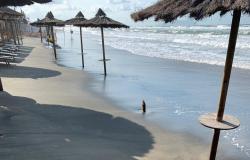
From Italian Somalia to the Italy of the Resistance passing through Calabria, where he grew up with his paternal uncles in Pizzo before arriving in Rome. His father Giuseppe, of Calabrian origins, and his sister Isabella, also born in Somalia, already lived here. This is the story of Giorgio Marincola, gold medal student for military valor, Italian-Somali partisan who, with dark skin, fought in the Italian Resistance under the battle name Mercurio between Piedmont and Trentino Alto Adige.
Born in Africa to a Calabrian father, he fell in battle at just 22 years old in Stramentizzo, near Castel di Fiemme, in the province of Trento, on 4 May 1945. With his companions he was still opposing the Nazis in a newly liberated Italy.
Born in Somalia and raised in Calabria
Giorgio Marincola was born on 23 September 1923 in Mahaddei Uen, an Italian military garrison 50 kilometers from Mogadishu, in Italian Somalia. He was the son of the infantry marshal major, the Calabrian Giuseppe Marincola (Pizzo Calabro, 1891-Rome 1956), stationed in Somalia at the time of the Italian protectorate, and Aschirò Hassan, born in 1901 in Harardere, a town 400 km north-east of Mogadishu. Giorgio, the name of his paternal grandfather, was the older brother of Isabella, born in September 1925 in Mogadishu and named after her paternal grandmother.
Both, recognized by their father and removed from their mother, they moved to Italy. Isabella dedicated herself to cinema and theater, becoming the very young mulatto rice weeder in the film “Bitter Rice”, directed by Giuseppe De Santis with performers of the caliber of Vittorio Gassman, (the Calabrian from Tropea) Raf Vallone and Silvana Mangano. Only Isabella / Timira, who had lived with her father and new family in Rome, after decades and a tormented life, saw her mother again when she returned to Somalia for a long period in the 1960s. Giorgio did not have this opportunity. He died young on the battlefields in Italy in 1945.
Arrived in Italy, little Giorgio was entrusted to his paternal uncle Carmelo and his aunt Eleonora Calcaterra. He lived with them in Pizzo Calabro until 1933when he then moved to Rome while attending high school.
Dark skin in Fascist Italy
A composite identity written on his dark skin and a soul lit by the fervor of freedom from the oppressor in a fascist Italy close to the entry into force of the racial laws (1938). George he attended the Umberto I high school in Rome and he was a student of the History and Philosophy teacher Pilo Albertelli, founder of the Action Party, murdered in the Fosse Ardeatine. In 1941 he enrolled in the Faculty of Medicine, but did not complete his studies because, in his early twenties, he joined the partisan group of the Action party in Rome and then joined the first partisan formations active in the Viterbo area.
Commitment to the Resistance
His fight did not stop with the liberation of Rome in 1944. Giorgio Marincola in fact “he wanted to give more”, as stated in the motivation for the Gold Medal for Military Valour. So he enlisted, with the rank of lieutenant, in the Special Force of the Allied Command. Parachuted into Piedmont, he organized sabotage actions and attacks against the Nazi-fascist forces in the Biella area. Captured by the Germans in January 1945near Zimone, “Marino” (from the surname of a Calabrian uncle with whom he grew up and one of the names he used in battle together with Mercurio and Marcuzio during the Resistance) he was taken to Villa Schneider.
The declaration of Freedom on Radio Baita
Here he was forced to send a deceptive message to trap his companions, through an intervention on radio Baita, a mere propaganda instrument of anti-partisan struggle in the hands of the SS. George not only disobeyed but went down in history for the fearless declaration of Freedom which, instead of the deceptive message to make his companions fall, he uttered. A reckless act in that dark era of oppression and denial of all rights.
«I feel my homeland as a culture and a feeling of freedom, not as just any color on the map. The homeland cannot be identified with dictatorships similar to the fascist one. Homeland means freedom and justice for the Peoples of the World. This is why I fight oppressors».
The transmission was abruptly interrupted and he he paid for the courage of his spirit and his words suffering violent beatings. First transported to the hospital in Biella, he was then imprisoned and sentenced to forced labor. After a few weeks he was assigned to deportation from Turin prison to Germany. But he was freed first, when he was still in the Gries transit camp in Bolzano. It was April 30, 1945. Once again he didn’t stop. He took up arms to liberate Trentino still in the hands of the Nazis.
Until my last breath
Giorgio’s partisan spirit, in fact, did not calm down. The war wasn’t over yet. He refused to take refuge in Switzerland and still resisted, joining the partisans in Val di Fiemme who in May were involved in the massacre perpetrated by the Germans retreating to Stramentizzo, in Trentino. Twenty-seven people, including patriots and unarmed civilians, were massacred between Stramentizzo and Molina di Fiemme. Those were the last Nazi massacres on Italian territory and took place between 3 and 4 May 1945.
Giorgio Marincola did not spare himself. Until his last breath he offered himself to the cause of freedom of the country where he lived and where he honored his origins as a father with his life and with the strenuous fight for freedom. As he courageously said, freedom is resistance to oppressors for a homeland, not dictated by geographical lines but a treasure chest of values to always be defended.
The gold medal for Military Valor
«As a young university student, immediately after the armistice he took part in the liberation struggle, distinguishing himself greatly in the Roman clandestine formations, for his decision and ability. Eager to continue the fight he joined a military mission and in August 1944 he was parachuted into the Biella area. He rendered valuable services in the organizational and information fields and in numerous firefights he demonstrated firm determination and legendary courage, sustaining wounds. Having fallen into enemy hands and forced to speak for propaganda on the radio, although he had to expect extreme reprisals, with a firm heart he took the opportunity to exalt his loyalty to the legitimate government. After harsh imprisonment, freed by an allied mission, he refused to seek safety through Switzerland and preferred to take up arms together with the Trentino partisans. He fell bravely in a clash with the German SS when the fight for freedom was now victoriously concluded.”
— Stramentizzo, 4 May 1945.
The story of his story
Its story is preserved in the historical essay entitled Partisan Race – History of Giorgio Marincola, published by Iacobelli in 2008, written by Carlo Costa and Lorenzo Teodonio. A few years earlier a paragraph was dedicated to him in the re-edition of Asce di Guerra edited by the Bolognese collective Wu Ming and Vitaliano Ravagli (Einaudi, 2005).
Expressions of the composite identity of second generation immigrants were Giorgio Marincola and his sister Isabella/Timira Hassan Marincola, whose story was entrusted to Timira book. A mixed-race novel, published by Einaudi in 2012, edited by his son Antar Mohamed and Wu Ming 2, pseudonym of Giovanni Cattabriga, one of the members of the Bolognese writers’ collective Wu Ming, who had already met and told the story of his brother Giorgio and who has been working for some time to bring the story of his uncle Giorgio out of the oblivion of memory and make it known.
Memorial tributes
In January 1946, the University of Rome conferred an “honorary” degree in memory of Giorgio Marincola. Furthermore, in 1964 it was given to the Italian-Somali partisan a street in Biella named after it.
September 9, 2009 the Anpi Pigneto-Torpignattara club in Rome is named in memory of Marincola.
In 2020, the Municipality of Rome decides to name the Metro C stop initially called Amba Aradam after him, place where fascist soldiers in Ethiopia killed 20 thousand people with the use of toxic gas and name of the avenue near the stop. The motion was proposed and approved in the wake of the anti-racist Black Lives Matter movement, once again at the attention of the international media after the murder of George Floyd.





